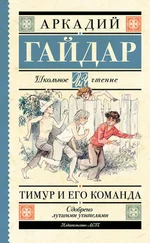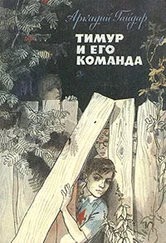| The youngster added his birchbark to the stack and said importantly: |
Малыш, укладывая бересту в поленницу, важно ответил: |
| "Can't you see, Grandma? It's me." |
- А ты, бабушка, не видишь - это я работаю. |
| The milkwoman came into the yard and the two old women began to talk excitedly about the strange happenings with the water and wood. |
Во двор вошла молочница, и обе старухи оживленно начали обсуждать эти странные происшествия с водой и с дровами. |
| They tried to pump the youngster but they learned very little from him. |
Пробовали они добиться ответа у малыша, однако добились немногого. |
| He told them that some people had dashed into the yard, stuck sweet strawberries into his mouth, had given him a feather and even promised to catch him a hare with two ears and four legs. |
Он объяснил им, что прискочили из ворот люди, сунули ему в рот сладкой земляники, дали перо и еще пообещали поймать ему зайца с двумя ушами и с четырьмя ногами. |
| Then they had stacked the firewood and run away. |
А потом дрова покидали и опять ускочили. |
| Annie came into the yard. |
В калитку вошла Нюрка. |
| "Annie," said Grandma, "did you see who came into our yard just now?" |
- Нюрка, - спросила ее бабка, - ты не видала, кто к нам сейчас во двор заскакивал? |
| "No, I was looking for the goat," Annie replied sourly. "Been running around all morning looking for her." |
- Я козу искала, - уныло ответила Нюрка. - Я все утро по лесу да по оврагам сама скакала. |
| "They stole her!" Grandma wailed, turning to the milk-woman. "What a goat she was! |
- Украли! - горестно пожаловалась бабка молочнице. - А какая была коза! |
| Not a goat but a regular dove. |
Ну, голубь, а не коза. |
| A dove!" |
Голубь! |
| "Some dove!" snorted Annie, moving away from her grandma. "When she starts tossing her horns you can't jump out of the way fast enough! |
- Голубь, - отодвигаясь от бабки, огрызнулась Нюрка. - Как почнет шнырять рогами, так не знаешь, куда и деваться. |
| Doves don't have horns." |
У голубей рогов не бывает. |
| "Hold your tongue, Ann! |
- Молчи, Нюрка! |
| Keep quiet, you silly good-for-nothing!" cried Grandma. "I'm not saying the goat wasn't a bit high-spirited. |
Молчи, разиня бестолковая! - закричала бабка. -Оно, конечно, коза была с характером. |
| I wanted to sell the darling. |
И я ее, козушку, продать хотела. |
| And my dove has flown." |
А теперь вот моей голубушки и нету. |
| At that moment the gate flew open with a screech. |
Калитка со скрипом распахнулась. |
| Sweeping the ground with its horns, the goat galloped in and headed straight for the milkwoman. |
Низко опустив рога, во двор вбежала коза и устремилась прямо на молочницу. |
| That good woman snatched up her heavy milk can and leaped onto the porch with a shriek and the goat ran into the wall of the house and came to a stop. |
Подхватив тяжелый бидон, молочница с визгом вскочила на крыльцо, а коза, ударившись рогами о стену, остановилась. |
| Everybody noticed, then, that a board had been fastened to the animal's horns. On it was written: |
И тут все увидали, что к рогам козы крепко прикручен фанерный плакат, на котором крупно было выведено: |
| I am a goat-beware! A goat of note-take care! Who Annie would beat Vengeance I'll wreak! |
Я коза-коза, Всех людей гроза Кто Нюрку будет бить, Тому худо будет жить. |
| Meanwhile, at the corner beyond the fence, the boys, feeling very pleased with themselves, were laughing fit to split their sides. |
А на углу за забором хохотали довольные ребятишки. |
| Sima Simakov drove a stick into the ground and went galumphing round it in a wild dance, chanting proudly: |
Воткнув в землю палку, притопывая вокруг нее, приплясывая, Сима Симаков гордо пропел: |
| We are not a gang of roughs Nor a rabble band. We are disciplined and tough And our pranks are planned. Pioneers all are we! Pioneers are we! |
Мы не шайка и не банда, Не ватага удальцов, Мы веселая команда Пионеров-молодцов У-ух, ты! |
| Then the boys darted off noiselessly like a flock of martins. |
И, как стайка стрижей, ребята стремительно и бесшумно умчались прочь. |
| There was still plenty of work to do, but the chief thing now as to draw up an ultimatum and to send it to Misha Kvakin. |
...Работы на сегодня было еще немало, но, главное, сейчас надо было составить и отослать Мишке Квакину ультиматум. |
| Nobody knew how to draw up an ultimatum, so Timur asked his uncle. |
Как составляются ультиматумы, этого еще никто не знал, и Тимур спросил об этом у дяди. |
| His uncle explained that each country had its own way of drawing up ultimatums but that courtesy obliged you to wind them up with the following words: |
Тот объяснил ему, что каждая страна пишет ультиматум на свой манер, но в конце для вежливости полагается приписать: |
| "Please accept, Mr. Minister, the assurance of my highest esteem." |
"Примите, господин министр, уверение в совершеннейшем к Вам почтении". |
| After this the ultimatum should be tendered to the head of the hostile country by an accredited ambassador. |
Затем ультиматум через аккредитованного посла вручается правителю враждебной державы. |
| But this did not appeal to Timur or to any of the others. |
Но это дело ни Тимуру, ни его команде не понравилось. |
| First of all, they had no intention of conveying any kind of esteem to that hoodlum Kvakin; secondly, they had neither a permanent ambassador nor even an envoy accredited to Kvakin's gang. |
Во-первых, никакого почтения хулигану Квакину они передавать не хотели; во-вторых, ни постоянного посла, ни даже посланника при этой шайке у них не было. |
| After discussing the point they decided to send a simpler ultimatum, like the one the Zaporozhye Cossacks sent the Turkish sultan. They had all seen the picture of the Cossacks writing their ultimatum and they had read about how the brave fellows fought the Turks, the Tatars and the Poles. |
И, посоветовавшись, они решили отправить ультиматум попроще, на манер того послания запорожцев к турецкому султану, которое каждый видел на картине, когда читал о том, как смелые казаки боролись с турками, татарами и ляхами. |
| Behind the grey gate with the black-bordered red star in the shady garden of the house opposite the house where Olga and Jenny were living, a fair-haired little girl was making her way down the gravel walk. |
За серыми воротами с черно-красной звездой, в тенистом саду того дома, что стоял напротив дачи, где жили Ольга и Женя, по песчаной аллейке шла маленькая белокурая девчушка. |
| Her mother, a young and pretty woman but tired and sad-looking, was sitting in a rocking chair near the window; on the sill stood a huge bouquet of wild flowers. |
Ее мать, женщина молодая, красивая, но с лицом печальным и утомленным, сидела в качалке возле окна, на котором стоял пышный букет полевых цветов. |



